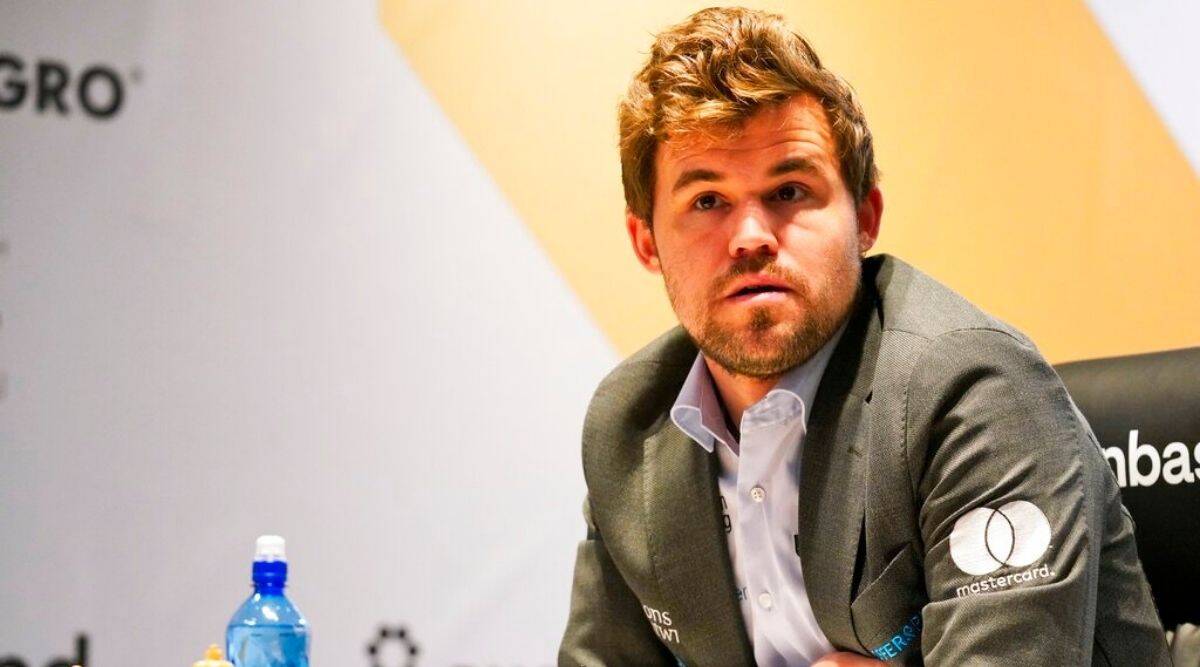Lack of competition and the monotony of focusing on challenger are the reasons the world champion wasn’t keen on defending title.
Thank you for reading this post, don't forget to subscribe!Shared News: July 21, 2022 3:25:42 pm
Magnus Carlsen will not defend his world championship title. (AP)
There was little shock in the chess world when Magnus Carlsen announced that he no longer intends to defend his world championship crown, firmly perched on his head since he snatched it from Viswanathan Anand in 2013. For, from the very beginning, Carlsen had been suspicious of the concept as well as the format of the tournament to decide the best chess player on the planet, and after four successive title defences in a decade of total domination, another defence no longer excites him.
As is his nature, he plainly admitted as much in the decision-announcing podcast with friend Magnus Barstad. “I am not motivated to play another match. I simply feel that I don’t have a lot to gain, I don’t particularly like it, and although I’m sure a match would be interesting for historical reasons and all of that, I don’t have any inclination to play and I will simply not play the match,” he said.
This was a sense of inevitability about it, the moment it emerged that he would have to defend his crown against the same man who he had defeated to win the fifth title last year in Dubai, Ian Nepomniachtchi. Soon after the final—the winning score of 7.5-3.5 with three games to spare was the most one-sided result in a world championship final in a century—Carlsen admitted to being tedious. “It’s been clear to me for most of the year that this world championship should be the last. It doesn’t mean as much any more as it once did,” he then told the press.
https://twitter.com/hashtag/InternationalChessDay2022?src=hash&ref_src=twsrc%5Etfw
The only chance he could have played the final was if his challenger was 19-year-old Iranian Alireza Firouzja, who in 2021 became the youngest in chess history to achieve a 2800 rating. The prospect of duelling a young challenger excited him, but his ouster not just reduced but minimised his prospects of title defence. The games in the Candidates tournament didn’t impress him much either. “Frankly I don’t think anybody’s played particularly well so far!” he had then said.
Moreover, the efforts in the build-up to the final seemed to outweigh the joy of playing the final and defending the crown. The preparations are long and tedious, from picking the seconds to analysing the opponent’s games. For example, for last year’s final, he spent three months with his seconds on openings alone. “The moment you know who your opponent is, he will always be there at the back of your mind. Every match, every tournament would be played with the final in mind. At least subconsciously, you are trying to beat the guy in the final in every game. That’s draining after a point, especially when you have to do it year after year’’ he had told Barstad in a podcast.
Not a chess nerd
Carlsen is not the archetypal chess nerd, who is wedded to the board, either. He has diverse interests—from football to fantasy football, and poker to padel tennis. He is a businessman, whose business venture Play Magnus has a market capitalisation of about $115 million and is the only publicly traded chess company in the world.
Besides, he felt that the format was long and dreary—best of 14 games with the rapid and blitz tie-breaks if the scores are level after 12 games. The Norwegian, according to rumours, wanted a best-of-three-sets-of-four classical games each, where rapid and blitz would follow at 2-2. A Russian newspaper claimed he was holding the final as a hostage to revise the format, an allegation that both FIDE and Carlsen denied.
But Carlsen was always critical of the World Championship format. Two years before he became the World Champion, he dropped out of the Candidates because he felt the system was flawed. In a letter to FIDE, he wrote: “The ongoing 2008–2012 cycle does not represent a system, sufficiently modern and fair, to provide the motivation I need to go through a lengthy process of preparations and matches and to perform at my best.”
A world champion refusing to defend his title is not without precedent though. The most scandalous one involved Bobby Fischer in 1975 because his demands of the format change were not met. Three years before that, he had almost pulled out of the final against Boris Spassky in Reykjavik, because the prize purse, he felt, was meagre but for the last-minute intervention of an American millionaire. The most vivid and long-lasting one involved Garry Kasparov, who broke from FIDE alleging corruption and founded the Classical World Chess Championship. Subsequently, for more than a decade, there were rival world champions.
An indirect recurrence awaits—while one of Nepomniachtchi or Ding Liren would become the new world champion, Carlsen would continue to be the world’s best player by all yardsticks. The World Championship final would be poorer though—less glamorous and possibly less funded. “It will hurt the game for a while because after all you are losing a champion and it is a very strange transition,” Viswanathan Anand had told Media recently. “But chess would move on,” he added.
Carlsen too would move on, fuelled by fresh challenges. Perhaps he would want to break the 2900 ELO ceiling—his peak rating was 2884 in 2014. A feat he equates with scaling Everest. “I’ll love to make it to 2900! It is very motivating to work towards that,” he had tweeted at the start of this year. Or maybe he wants to learn a new sport, or perhaps he wants to go through the Candidates rigour again, or start a parallel chess universe. Anything that could break the tedium of a serial champion.


